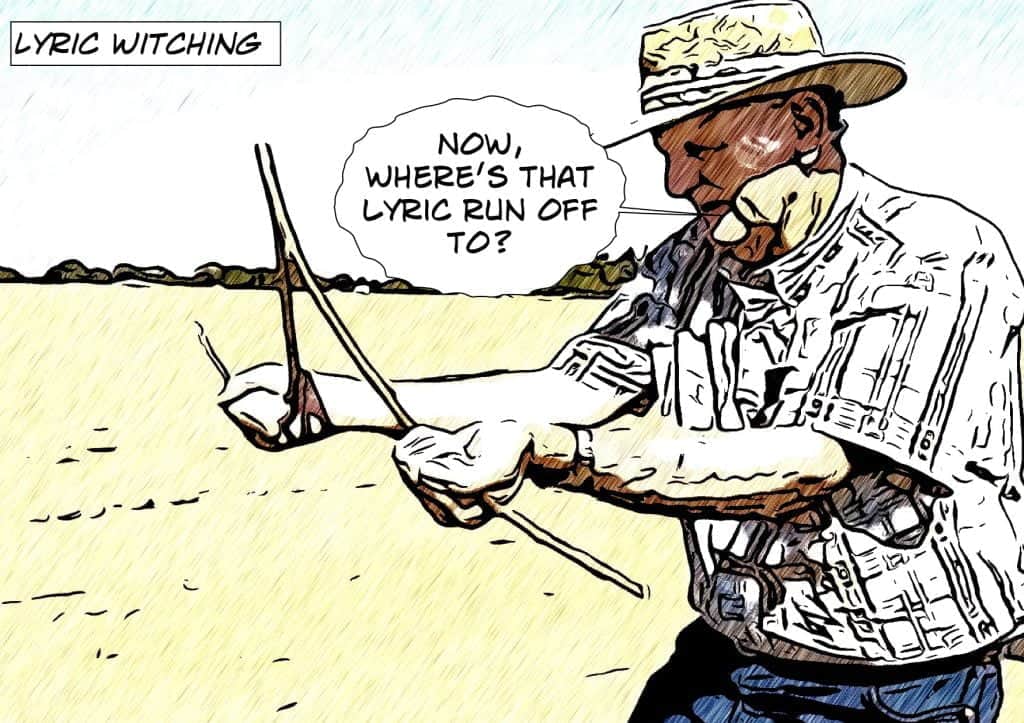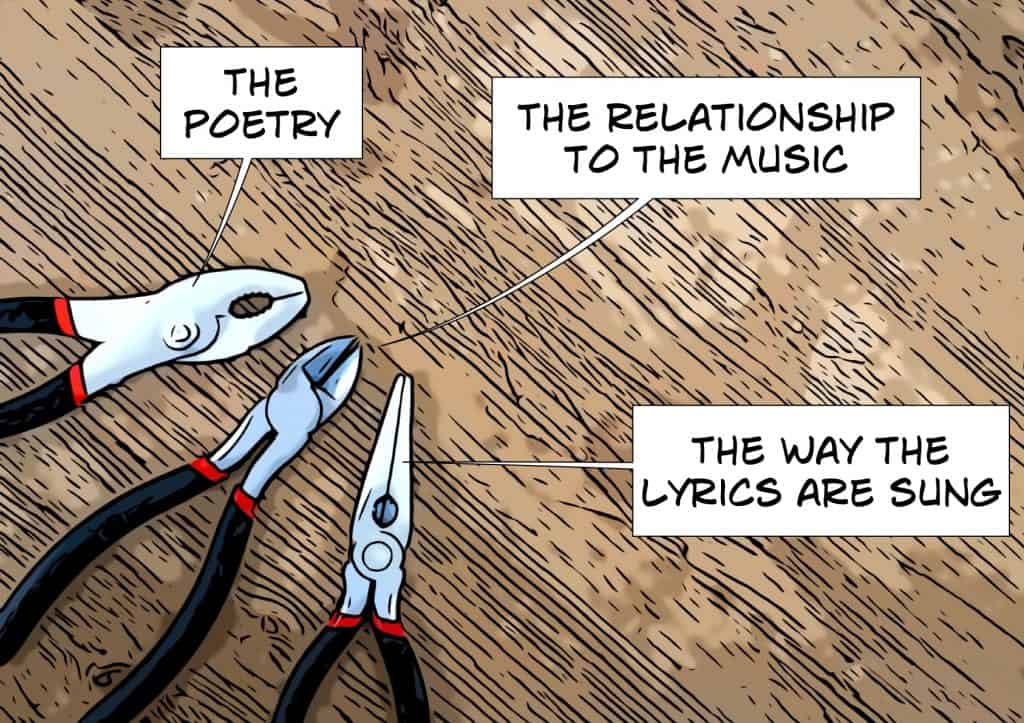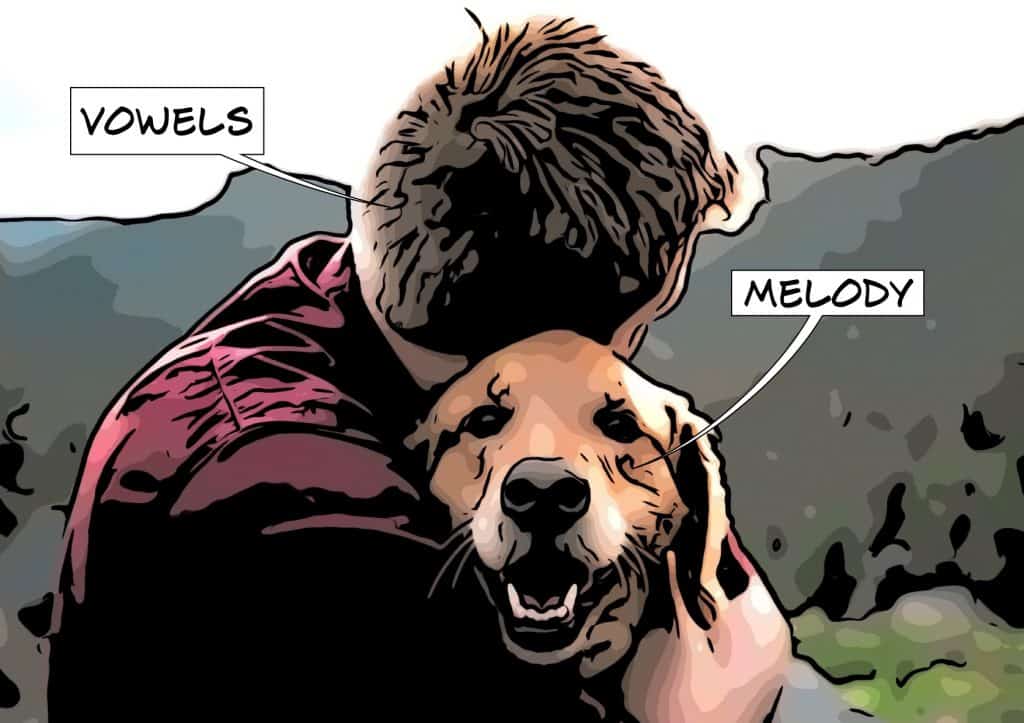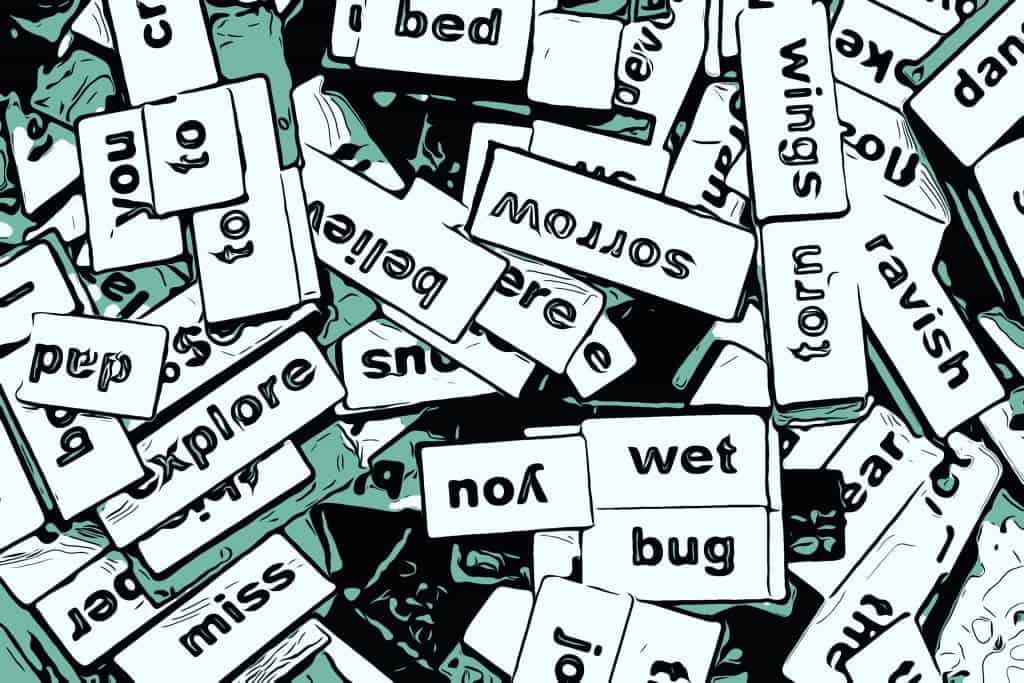There’s no formula for how to write song lyrics just as there is no formula to songwriting. The landscape of your song will be very different from the landscape of mine. Even so, with some close observation, some close listening, there are ways to find the wells from which songs emerge. You can set up circumstances in which songs are likely to happen.
So writing song lyrics is sort of like water witching. You gotta find the water wells.

Some songwriters like words, others not so much. You can write great song lyrics that sound like Milton or you can write great song lyrics that sound like dogs barking. There are no rules.
No matter what kind of lyrics you want to write, you’re going to need some guideposts. I’ll begin by having a closer look at the tools a lyricist can play with and then we’ll get into the creative process of actually writing your lyrics.
We’re going to cover the tools available to lyricists and then get on with our 12 tips.
All our help on writing a song can be found here.
The Tools for Writing Song Lyrics
Let us begin by laying all of the lyric writing tools out on the table and having a good look at them. Songwriters play with some or all of these aspects of a lyric:
- The Poetry
- The Relationship to the Music
- The Way the Lyrics are Sung

The Poetry
Song lyrics are a kind of poetry. But they have different needs. Lyrics are different than poems because they need to change as soon as they are set to music.
Some songwriters prefer to writing song lyrics without music first, then setting it musically when it’s “finished”. If you work this way, thinking about the natural stresses of your words is key.
Tip 1: Rhythm is your friend
All language has a natural rhythm to it that we can use. Poets count the beats in each line of text and have rules about them, just as we fit our words into bar lines. These lines from Oscar Wilde’s Ballad of Reading Gaol are basically a song in 4/4. It seems like he knew how to write lyrics. You can feel the rest on the lines missing a beat.
I never saw a man who looked
With such a wistful eye [REST]
Upon that little tent of blue
Which prisoners call the sky [REST]
Rhythm is your friend – especially, if you’re inclined to write something interesting. Bob Dylan is often credited as a songwriter who really wrote poetry. As he says, “It’s no secret that all of my lyrics are rhythmically oriented.”
Dylan’s To Ramona comes to mind:
Your cracked country lips, I still wish to kiss
As to be by the strength of your skin
Your magnetic movements still capture the minutes I’m in
Tip 2: Vowels are good friends with Melody

Don’t get married to your words on the page. You will need some wiggle room when you set the lyrics to music. Vocal expression is also going to demand some changes to your lyric. (See here for ideas on melody and other songwriting tips)
The most common adjustments to your “finished” lyrics will be:
1) Adjusting the rhythm of the text
2) Finding vowels you can sing on
Sammy Cahn, the great lyricist puts it this way:
Finding vowels is a simple solution that opens up expressive doors in your vocals. Cahn is right, you can’t sing ‘locksmiths’. Simply find different words with singable vowels. For example, instead of “refrigerate”, you might use “keep cool”. Obviously, “keeeeeep coooooooool” is much more fun to sing.
Tip 3: How to write song lyrics? Use fewer words
And when, nothing else works with your song lyric, just use fewer words. Most songs will force you to do so anyway. Melodies are such good friends with vowels that sometimes they even prefer a vowel by itself like “Ahh!” instead of a word.
When asked about Coldplay’s use of wordless choruses Chris Martin said:
“People say it’s a bit repetitive to say ‘Oh, oh, oh, oh, oh ,oh’ but you can’t translate the melody into words.”
Chris Martin
Or if you’re not sure what to write a song about, you can just write doop-doo-de-doop, like Blossom Dearie:
The Relationship to the Music
The relationship of the lyrics to the music is another tool on the table you can play with. Lyrics will either agree with the music or fight against it.
Tip 4: Contrasting the mood of your lyrics with the mood of your music can bear unexpected fruit
There will be times when you have a lyric that just needs a simple setting, nothing in the way of the idea, nothing working against it. The music adjusts all of its elements to suit this idea. It’s direct. It’s honest.
But often songwriters find they are able to say much more when the lyrics are working against the music. Frank Zappa says it like this:
“Sometimes it’s like a difference tone. That’s where you have a note and a note and the combination of these two notes gives you a third note, which is a difference tone. You get a theoretical difference tone from lyrics which are set ironically. The sum of the total package is more than just these words, this chord. You get the third concept, which is that these two things don’t belong together but somebody put them there.”
Frank Zappa
Some classic examples of songs that use contrasting lyrics and music are:
- Girlfriend in a Coma, The Smiths
- Born in the USA, Bruce Sprinsteen
- Hey Ya!, Outkast
- Mamma Mia, ABBA
The Way the Lyrics are Sung
The way lyrics are sung can change the entire experience for the listener. In many songs, the lyrics have almost nothing to do with the overall expression the listener is receiving. It’s almost as if lyrics don’t matter at all.
Like the song Yellow Ledbetter by Pearl Jam. Eddie Vedder improvised some gibberish text on the take, and they kept it!
Tip 5: You can choose to be understood or not
I used to think that the chorus to the song Hungry Eyes from Top Gun was “How I want green eyes” instead of “hungry eyes”. A friend of mine thought that the line “Parsley, Sage, Rosemary and Thyme” from Scarborough Fair by Simon and Garfunkle was “Parsley trees grow very unkind.”
With a lot of songs, I find myself disappointed when I learn the actual lyrics. The version I had in my head was more satisfying.
A lot of songwriters want to keep mystery in the text, so they deliberately sing it in a unclear way. In this way, the lyrics are only meant to be read, not heard. It’s a way of using words without the baggage of words.
How to write song lyrics: The Creative Process
Now that we’ve looked at the tools on the table, let’s talk about the creative process of writing song lyrics.
Tip 6: Inspiration for song lyrics: Trick yourself into giving up the good material
Sometimes you know where the well is but you can’t remember how you ever got there. In other words, you think you know how to write song lyrics but when you try to, it doesn’t happen. So you have to find some tricks.
Say you wanted to write a song about your girlfriend. You might start describing her hair or how much you love her or you might start writing down a list of rehearsed stories you’ve told other people about her. And that would be fine. But if you looked at her face with fresh eyes and wrote down the things you never noticed about her before this moment, now that might be closer to the well.
It’s like Paul Simon says, the things we’re determined to say are somehow not as interesting as the things we’re thinking.
“What you’re determined to say is filled with all your rationalizations and your defenses and all of that. What you want to say to the world as opposed to what you’re thinking. And as a lyricist, my job is to find out what it is that I’m thinking. Even if it’s something that I don’t want to be thinking.”
Paul Simon
Tip 7: How to write song lyrics? Develop Amazing Powers of Observation
To find the wells, you’ve got to notice things. Songwriting is a kind of poetry. And the poet needs to see with fresh eyes and write it down.
Simply make notes of the things you never noticed before. As I mentioned earlier, seeing things with fresh eyes can help you find some great lyrics. Use all your senses. What have you never noticed about ____ before this moment? What does it feel like? What does it taste like?
Simply observe. The words we come up with by simply observing ourselves and the outside world often say more about us than what we can summon up when we “sit down to write”.
Tip 8: Use Word Pools

Collect words, forget about meaning. Words we randomly select from our daily lives can also open up new doors in your lyrics.
Words are in everything, everywhere. Collect them: names of people, streets, plants, car parts; words about weather; sounds; colors.
Chop them up with a scissors and start combining. David Bowie, Kurt Cobain, and Thom Yorke famously used this chopped-up words technique regularly.
Tip 9: What to write a song about? Use Yourself
Songwriters love to talk about themselves. Eminem is perfect example. He talks about himself. He renames himself. He writes about what you think of him, what you probably think of him…
And I am, whatever you say I am
If I wasn’t, then why would I say I am?
The Way I Am, Eminem
Writing about yourself doesn’t necessarily mean you’re an ego-manaic. It’s a great source of material. Even when people are not talking about themselves they are sort of talking about themselves. If you were to describe your surroundings right now, or the weather, you would reveal quite a lot about yourself without talking about yourself.
It’s like Walt Whitman says in his poem Song of Myself: “every atom belonging to me, as good belongs to you”.
I celebrate myself, and sing myself,
And what I assume you shall assume,
For every atom belonging to me as good belongs to you.
…
Stop this day and night with me and you shall possess the origin of all poems,
You shall possess the good of the earth and sun, (there are millions of suns left,)
You shall no longer take things at second or third hand, nor look through the eyes of the dead, nor feed on the spectres in books,
You shall not look through my eyes either, nor take things from me,
You shall listen to all sides and filter them from your self.
Get creative as you describe yourself.
Where do you come from? Who are your parents? Who do you wish your parents were? What have you let go of? What are your demons? What brand of cigarettes are you? Which kind of fish are you? What’s the weather like in your head? Write it all down.
Tip 10: How to write lyrics? Talk to someone who isn’t there
It’s quite simple. Pretend someone is with you. Talk to them. There’s a slew of songs that employ this technique. It’s nearly a genre. To name a few:
- Hey Joe, Jimi Hendrix
- Fourth of July, Sufjan Stevens; Boots of Spanish Leather, Bob Dylan
- Old Man, Neil Young
- A Case of You, Joni Mitchell
In Bob’s Words:
“That’s another way of writing a song, of course. Just talking to somebody that ain’t there. That’s the best way. That’s the truest way. Then it just becomes a question of how heroic your speech is. To me, it’s something to strive after.”
Bob Dylan
Tip 11: Choose a theme
Life presents us with themes. The theme of our life one year might be love, the next year money, the next, getting older. Your life could become dominated by a place, like “home” or London.
Songwriters and poets reflect these themes in their words. Themes help us choose what to write a song about. The theme could become an album of songs like Lou Reed’s New York, an epic poem like William Carlos Williams’ Paterson or an entire musical genre like Gangsta Rap.
The specifics of the theme, the atmosphere, the places and people can be a great inspiration for song lyrics. It’s also helps the listener as they don’t have to create a new world with each track.
Tip 12: Go where the song is
As a final note, sometimes we have to physically go where the life is to find our song wells. Songs are likely to happen in the places where we actively look for them. There’s a riddle for you.
Justin Vernon, or Bon Iver, had to hole up in a Wisconsin cabin for a winter before he could write his first album. John Lennon wrote Strawberry Fields after a revisiting the garden of a children’s home in Liverpool from his childhood. Paul Simon was only able to write the title track for Graceland after actually going to Memphis.
As you learn how to write song lyrics, you become obliged to wake up to the world within you and around you. Sometimes you might have to physically follow strange roads to your songs. But it’s worth it. If you’re able to get in touch with your powers of observation, you’ll have done something a lot larger than simply writing a song.
Questions or Comments?
Join the discussion here on Facebook.